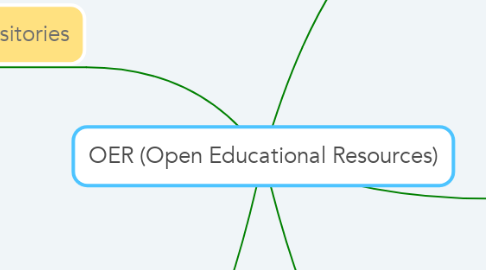OER (Open Educational Resources)
by Christian Smeltzer

1. OER textbook repositories
1.1. openstax
1.2. BCcampus
1.3. Open Education Group
1.4. Global Text Project
1.5. Green Tea Press
1.6. InTechOpen
1.7. LibreTexts
1.8. MIT Open Courseware
1.9. Noba
1.10. Online Mathematics Textbooks
1.11. OpenBook Publishers
1.12. Open Textbook Initiative
1.13. ScholarWorks@GVSU
1.14. Orange Grove: Textbooks and Courseware
1.15. MERLOT: Textbooks
1.16. OER Commons
1.17. Open SUNY
1.18. FreeTechBooks
2. Concerns
2.1. Quality
2.2. Time to change curriculum
2.3. Potentially outdated
2.4. Lack of supplemental materials
2.5. Decrease faculty job security (content being used outside of university causing lower enrollments)
2.6. Funding for development
3. Pros
3.1. Electronically available
3.2. More accessible
3.3. More interactive
3.4. Potentially more up-to-date
3.5. Cost
3.6. Adjustable to faculties current curriculum
4. Principles
4.1. Redistribute
4.2. Remix
4.3. Revise
4.4. Reuse
4.5. Retain
5. Types of assets
5.1. Text Books
5.2. Digital simulations
5.3. Videos
5.4. Podcasts
5.5. Test/quiz question bank


